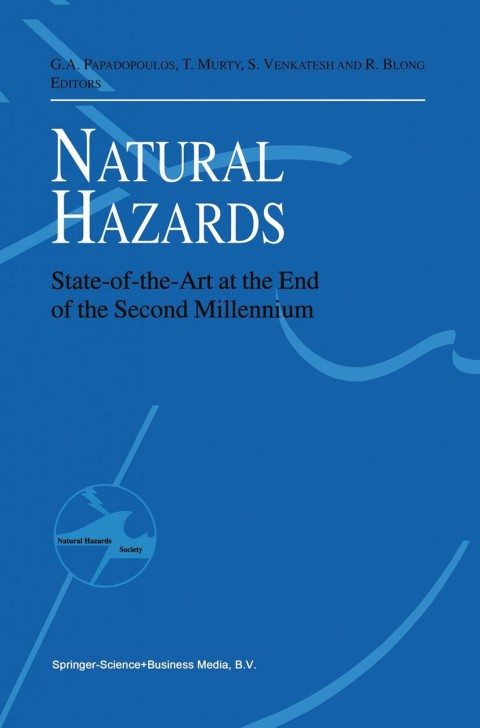Description
Efnisyfirlit
- Cover
- Title Page
- Copyright Page
- Table of Contents
- Editorial
- Regional Air Quality Modelling in Canada — Applications for Policy and Real-Time Prediction
- 1. Introduction
- 2. Acid Deposition
- 3. Acid Deposition Monitoring
- 4. Acid Deposition Modelling
- 5. Photochemical Smog
- 6. NOx/VOC Modelling in the WQC and SAR
- 7. Real-Time Prediction
- 8. Summary and Concluding Remarks
- Acknowledgements
- References
- The 1997 El Niño, Indonesian Forest Fires and the Malaysian Smoke Problem: A Deadly Combination of Natural and Man-Made Hazard
- 1. Introduction
- 2. Indonesian Forest Fires: An Ongoing Problem
- 3. Incidences of Extreme Smoke Pollution: Analysis and Discussion
- 4. Mitigation Measures
- 5. Summary and Conclusions
- Acknowledgements
- References
- Three-Dimensional Simulation of Water Circulation in the Java Sea: Influence of Wind Waves on Surface and Bottom Stresses
- 1. Introduction
- 2. Three-Dimensional Hydrodynamic Model
- 3. Wave Effects on the Surface Stress
- 4. Wave Effects on the Bottom Stress
- 5. Application of the Model to the Java Sea
- 6. Concluding Remarks
- References
- Tidal Changes and Coastal Hazards: Past, Present and Future
- 1. Introduction
- 2. Tidal Changes
- 3. Conclusions — Tides and Coastal Hazards
- Acknowledgements
- References
- Tsunamis Observed on and Near the Turkish Coast
- 1. Introduction
- 2. Data
- 3. Tsunamis Observed on the Turkish Coasts and Adjacent Areas
- 4. Conclusion
- Acknowledgements
- Appendix
- List of Tsunamis
- References
- Post-Tsunami Field Survey Procedures: An Outline
- 1. Introduction
- 2. The Tsunami Syndrome and Its Local Effects
- 3. Post-Tsunami Field Survey
- 4. Conclusions
- Acknowledgements
- References
- An Analysis of the Recent Severe Storm Surge Disaster Events in China
- 1. Introduction
- 2. An Assessment of Damage
- 3. Progress of Precautions against Storm Surge Disaster in China
- 4. What Can We Learn from Recent Storm Surge Disasters?
- Acknowledgement
- References
- Risk Assessment, Emergency Preparedness and Response to Hazards: The Case of the 1997 Red River Valley Flood, Canada
- 1. Introduction
- 2. Historical Floods
- 3. Flood Prevention by Control Structures
- 4. Legislative and Institutional Framework for Emergency Preparedness
- 5. The 1997 Flood Experience: Preparedness and Responses
- 6. Conclusions
- Acknowledgements
- References
- Robust Statistical Methods to Discriminate Extreme Events in Geoelectrical Precursory Signals: Implications with Earthquake Prediction
- 1. Introduction
- 2. Geological and Seismological Settings
- 3. Data
- 4. Identification of Extreme Events
- 5. Conclusions
- References
- Hydrogeochemical Precursors in Kamchatka (Russia) Related to the Strongest Earthquakes in 1988–1997
- 1. Introduction
- 2. Seismicity and Hydrogeochemical Stations
- 3. Results
- 4. Discussion
- 5. Conclusions
- References
- Multifractal Analysis of the Arnea, Greece Seismicity with Potential Implications for Earthquake Prediction
- 1. Introduction
- 2. Seismic Sequence, Study Area and Earthquake Catalogue
- 3. Multifractal Method
- 4. Results
- 5. Discussion and Conclusions
- Acknowledgements
- References
- Estimation of Strong Ground Motion Due to Hypothetical Fault Ruptures and Comparison with Recorded Values: The Zakynthos, Western Greece Earthquake of 18 November 1997
- 1. Introduction
- 2. Estimation of the Ground Motion
- 3. The Zakynthos (Western Greece) Earthquake of 18 November 1997
- 4. Comparison of Results
- 5. Discussion and Conclusions
- References
- Electrical Impedance Spectroscopy Used as a Tool for the Detection of Fractures in Rock Samples Exposed to either Hydrostatic or Triaxial Pressure Conditions
- 1. Introduction
- 2. Experimental
- 3. Frequency Dependence of the Electrical Conductivity
- 4. Results and Discussion
- 5. Conclusion
- Acknowledgements
- References
- Earthquake Hazard for the Czech Republic, Poland and Slovakia — Contribution to the ILC/IASPEI Global Seismic Hazard Assessment Program
- 1. Introduction
- 2. Input Data
- 3. Hazard Maps in Terms of Macroseismic Intensities
- 4. Hazard Maps in Terms of Peak Ground Accelerations
- 5. Conclusion
- Acknowledgements
- References
- Contribution of Geographical Information Systems to the Management of Volcanic Crises
- 1. Introduction
- 2. Background
- 3. Study Area Characteristics
- 4. Study Objectives
- 5. Risk Assessment System’s Architecture Generation
- 6. Results
- 7. Conclusions
- Acknowledgements
- References
- GIS and Volcanic Risk Management
- 1. Introduction
- 2. GIS Layers
- 3. Risk Management by a GIS
- Acknowledgements
- References
- A Systems Approach to Modeling Catastrophic Risk and Insurability
- 1. Introduction
- 2. The Model Description
- 3. The Stochastic Optimization Procedure
- 4. Numerical Experiments
- 5. Conclusions
- Appendix: Direct and Indirect Losses: Catastrophe Chains
- References
- Hazards-98: Summary of Papers
- 1. Introduction
- 2. Plenary Session
- 3. Earthquakes
- 4. Meteorological Hazards
- 5. Socioeconomic Aspects
- 6. Tsunamis
- Acknowledgements





